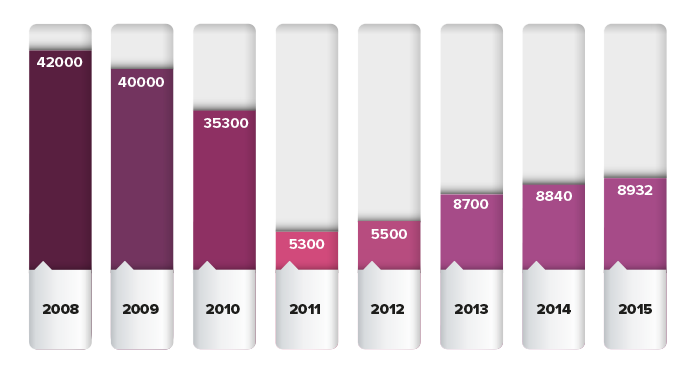Quelle: Frontex
General characteristics
Circular irregular migration across the land border between Greece and Albania was, for many years, one of the most significant irregular migratory flows across the EU’s external borders. In 2008 and 2009, detections between Albania and Greece represented nearly 40% of all detections of illegal border crossings at an EU level. In 2010, detections decreased slightly to 35 300, but still represented 34% of the EU total. The principal reason of this flow is mainly economic, with most migrants taking up seasonal jobs in agriculture and the construction business.
Upon detection, Albanian nationals crossing the border illegally were immediately returned to Albania, but quickly attempted re-entry to Greece. The fact that Albanian migrants could easily, cheaply and repeatedly attempt to illegally cross the border with Greece, and that Greek businesses which illegally employed Albanians were rarely prosecuted, combined to form strong pull factors.
Migratory trends
Since being granted visa-free travel to the European Union in late 2010, Albanian nationals have been detected crossing the border illegally in much lower numbers, with only slightly more than 5 000 detections in 2011 and 2012, representing respectively only 4% and 7.6% of the European Union total.
Albanian migrants are still typified by circular migration to Greece, though this legal flow is now routed through land border crossing points rather than by migrant workers seeking to circumvent border controls by entering undetected. Indeed, Albanians are now refused entry to Greece in larger numbers than before visa liberalisation. In addition, other movements of Albanian nationals are now reflected in a) refusals of entry to Italy and Slovenia, b) illegal stay detections by many other European Union Member States and Schengen Associate Countries and c) detections of document fraud primarily en route between Schengen area and United Kingdom and Ireland.
The reduction in illegal border crossings has allowed Albanian border-control authorities to refocus some of their surveillance efforts on other cross-border criminal activities, such as smuggling of goods, resulting in significantly increased cannabis seizures.
The broadening of legal travel options has reduced substantially the number of Albanians detected staying illegally in Greece. By contrast, detections of illegally-staying Albanians have increased in several other Member States such as France, United Kingdom, Belgium, Germany and Sweden.
Since visa liberalisation, Albanian nationals are still detected illegally crossing the border into Greece but at a lower level than in previous years. In 2014 worth noting was a high level of refusals of entry (mostly for having an alert in the SIS) and document fraud (counterfeit border-crossing stamps to fabricate travel histories and extended periods of stay in the Schengen area).

